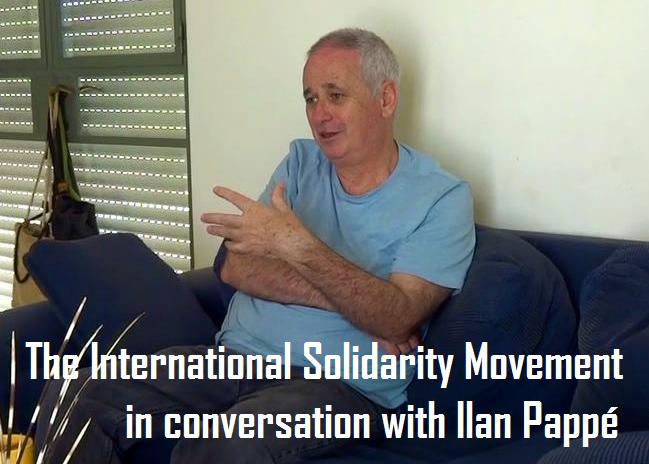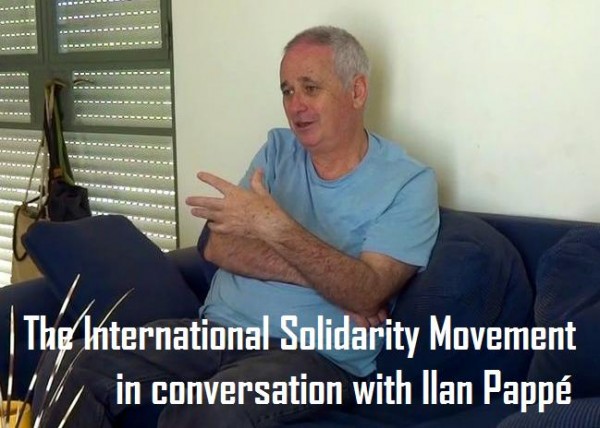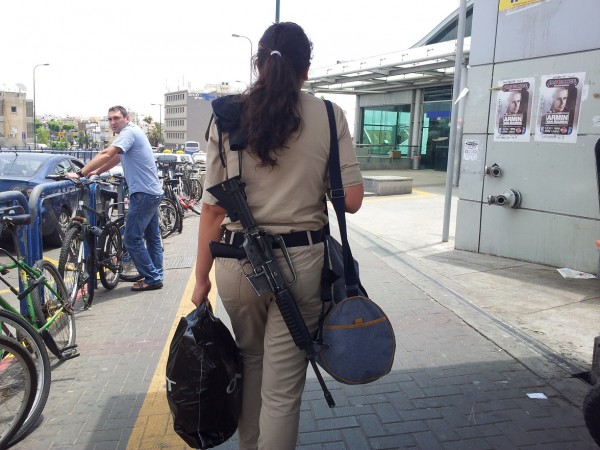11th July 2013 | International Solidarity Movement | Haifa
Ilan Pappé is an Israeli academic and activist. He is currently a professor at the University of Exeter (UK) and is well known for being one of the Israeli “new historians” – re-writing the Zionist narrative of the Palestinian Israeli situation. He has publicly spoken out against Israel’s policies of ethnic cleansing of Palestine and condemned the Israeli occupation and apartheid regime. He has also supported the Boycott, Divestments and Sanctions (BDS) campaign, calling for the international community to take action against Israel’s Zionist policies.
Activists from the International Solidarity Movement had the opportunity to talk to Professor Pappé about the ethnic cleansing of Palestine, Israeli politics and society and the role of the international community and solidarity activists in Palestine, resulting in a three part series of interviews which will be released on the ISM website in the coming weeks.
This is the second section; Israeli politics and society. Find part one on the ethnic cleansing of Palestine here.
International Solidarity Movement: We were following the last Israeli elections and we were surprised to see that there was no actual talk about Palestine, it was all basically about internal issues. Then after the elections, Netanyahu commented about extending the settlements. What do you think about this?
Ilan Pappé: Your observation is correct. Israeli voters think that the problem of the West Bank has been solved, so they think there is no need to either talk about it, or come up with solutions. You propose a solution as an idea for an election only if you think there is a problem, which they think is not the case here. They think that what we have is good for Palestinians and good for Israelis. They think that the world is stupidly trying to create a problem that is not there, and is trying to be involved where there is no need to be. They think that even if there are still missiles coming from Gaza, Israel has a strong army that will answer back. So, if you speak with Israelis in the subway, they will tell you that there is not a problem between Israel and Palestine.
The only thing that makes Israelis think about Palestine is when the boycott campaign is successful, like what happened recently with Stephen Hawking. Do you know what the problem is? 95% of Israelis don’t even want to go to the West Bank, so they don’t know what is really happening. Or they know what is happening only from their children who are serving as soldiers. But their children don’t tell them about the checkpoints, the arrests from homes and all the other awful things. Israelis could know if they wanted to – they have the internet – but they don’t want to. For example in Tivon, my neighbourhood, everybody votes for the left, but if you ask them if they have ever seen a checkpoint or the apartheid wall, or if any one of them wants to go to the West Bank and see what the soldiers and settlers are doing, they will say no. They’ll tell you that’s not their problem. They have other problems – standard of living, house prices, the new car, the education of their children etc.
ISM: Yair Lapid, the head of the Ministry of Finance of the new coalition government, stated on 20th May that Israel is not going to stop the colonization of the West Bank or end subsidies for illegal settlers, which in fact will not only continue but increase. Do you think that any switch of parties in power could truly make an impact on this situation?
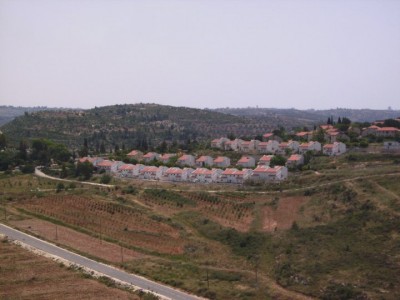
IP: No. We haven’t had any party or leader different from the others, including Rabin, who became a hero after he was shot. Israelis like Lapid are always busy implementing policies so that the land has no Palestinians – so in this sense Lapid is just continuing what everyone before him was doing. The problem they have is not technical – they know how to do it, they have a script. They do not build new settlements, but they allow the natural growth of the current settlements, while Palestinians are not allowed natural growth. Then they say they’re not building a new settlement, but need to build a new neighbourhood because the settlement population has grown. So you can see from this that they do not have any technical problem, it’s more that they maintain this funny dialogue with the world: “You know that we are colonizing, you know that we are ethnically cleansing the Palestinians, you know that we are keeping them in prison, but still we are playing this game where we are speaking about a peace process.”
The only problem that Israel has – although within 10 years I unfortunately don’t believe it will be a problem anymore, unless we change something – is that they still think that what they’re doing will never be accepted by the world, so they think they need to find a new language for what they’re doing. But practically on the ground I don’t think there has been one day since 1967 that something was not built by the Israelis in the West Bank, whether it’s a house or a flat or a road or a balcony, it goes on and it will continue.
Israel knows that the EU and the USA will not stop supporting them, and they’re right. So they will talk about stopping colonization, but they will not actually stop it. This is something to worry about because that’s the reality. Lapid comes from the new generation of politicians and I think that when you are new in politics you say a bit more openly what you are doing. Then, like Silvio Berlusconi, when you have another term, you stop saying what you are actually doing. So, if Lapid were to become Prime Minister, he would stop saying what he’s doing, he’d say, “we are not building, we are just fabricating.”
Today, there is no hope for a change from within the Israeli political system. This system is just going to get more and more right wing, and less and less willing to change Israel’s unilateral policies.
ISM: There is this new far-right party “The Jewish Home” that just entered the government following the recent elections, with leader Naftali Bennet, who became Minister of Religious Services and Industry, Trade and Labour. What kind of change will that bring?
IP: He is a very clever man, he comes from a settlement, and his main agenda is to strengthen the connection between the settlements and Israel. This was not openly his agenda during the elections. At that time he was talking to young Israelis in Tel Aviv about how nice it is to be Israeli, and saying that he would bring back pride in being Israeli – and it actually worked, they liked him. It was all about this idea of the ‘great nation’. And he added Judaism to this – saying it is not just good to be Israeli, but to be a Jewish Israeli. He is young, he was in the army, he was a military hero and a successful businessman. But he is not so different from Lapid, they live the same way – “it doesn’t matter whether you are from a settlement or from Tel Aviv, we are all from Israel”.
ISM: Do you think that the settlers will have more impact on Israeli politics because of Bennet’s success?
IP: Yes, I think so, but this is not so important. It doesn’t matter if you are from a settlement or from Tel Aviv, or if you are on the right or on the left. The basic Israeli ideology – Zionism – is the problem. I think that as long as Zionism is regarded as an ideal concept, the same policies will continue. If Israel has a more right-wing government – for example Netanyahu’s government compared to the Barak government – then the differences are small. You just have a few more checkpoints and a bit more brutality. But I think in the end it’s really just the same. What matters is not the government of Israel, but how much the Palestinians are willing to accept. If they are willing to accept the current reality, then Israel will allow them to work within Israel, remove some of the checkpoints, give them some more autonomy. But the moment Palestinians show some form of resistance, Israel is going to repress them brutally. Everything is about how much Palestinians accept the Israeli diktat.
ISM: You previously said that there is no more hope for a change at the political level in Israel. But on the other side, in what way do you view today’s Israeli citizens’ commitment against the occupation? How important is it that the present and future Israeli society challenges this form of colonization?
IP: I think that the forces that oppose the occupation are very small, but there have been two positive developments. First of all, the rejection of the occupation is growing and secondly, it is led by the new generation, not like before. This is an essential element. But, pressure from the international community and the Palestinian resistance will be the main factors that will bring down the occupation. One day, when we will need to rebuild a new society, it will be much better to know that there were many Jewish people who were fighting against the occupation. When the occupation ends and takes its apartheid with it, I am sure that a lot of Jewish people will say that they were against it, like the white South Africans said at the end of their apartheid system, but everybody knows that it was not the case during that period. It is good to see that this wave is growing every day. Nonetheless, a lot of Israelis, they still don’t know that there is a military occupation! For the future it is essential that this view changes, and it is changing.
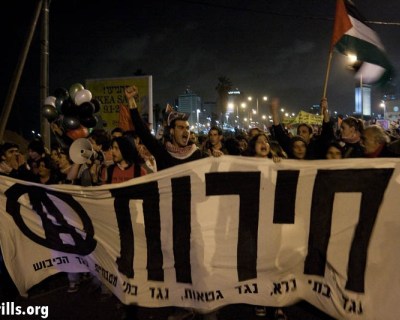
ISM: Young Israeli people often feel criticized when they travel abroad. Do you think that this criticism has an impact or influence on Israeli society?
IP: Yes, I think it’s good to criticize young Israelis abroad. Some of them have actually changed because of that, no doubt about it. There’s a wonderful YouTube clip which shows what happens to young Israelis abroad. The Israeli military used to show this clip about young Israelis going abroad, to India. It was a clip especially against the refuseniks – people who refuse to serve in the army. In the clip they’re all sitting with young nice Indian girls, then some young Europeans come along and ask the Israelis what they did in the army. One speaks about the time he was a commander and about how cool it was to be in the army, and the Europeans look at him amazed, like he’s a hero. Meanwhile, the refusenik seems ashamed, looking down, without saying anything, basically really uncomfortable because he didn’t serve in the army. So this Israeli anti-apartheid organization made a counter-video, with the same setting, but instead of being soldiers they were Israeli activists, and the ashamed person was the one who served in the army, he was the one feeling really uncomfortable.
Now in 2013, some young people do not buy the whole story of anti-Semitism. They meet people abroad of the same age who know about the occupation, and where older people might just say that the people are neo-Nazis or something, young people are more likely to see the difference between being against the occupation and being anti-Semitic. This is an important new development, which I have seen with my own eyes.
ISM: What are the long term effects, social and psychological, on Israeli youth because of military conscription?
IP: Military conscription frames your mind. It makes you see human beings through a rifle and therefore you dehumanize them. It makes you very insensitive to suffering of others and at the same time makes you very racist. It also makes you limited in the way you can think about new options in life, because power obscures your mind. In any kind of situation you will think that the only way out from a state of affairs is the use of force. This has very negative effects on Israeli youth and it is clearly just part of the heavy indoctrination they face throughout life.
Young Israelis do not often speak about the psychological problems that come afterwards. I went to the psychiatric department in Israel and the vast majority of people are young Israelis who served in the army. This is a secret in Israel, nobody talks about it. Two days ago a young boy who just finished his military service went into a bank that refused to give him a loan. He ended up shooting four people to death. This is just one example of the impact and effects of military conscription and militarization on the Israeli society.
ISM: How does it feel to live in Israel and at the same time be against the state? What are the consequences?
IP: It’s a fact that there are not many cases like mine and I pay a price for my position. So far, people like me pay a price not in the sense that the government is chasing them, it is different from other countries. Israel is such a racist state that it won’t do that to Jewish people. What they do instead, is to encourage society to punish you. The fact that I had to leave Haifa University is the result of this. They aim at the place where you work. For example, we had 4 brave former pilots that refused to serve in occupied Palestine because of what Israel was doing there – they were forced to leave their jobs outside of the military.
So, the public sphere or even your family or your friends make you pay a price, because you are considered a traitor. The reward you get is that you feel better about yourself and when you go abroad, people respect you. This, I hope, will encourage people to pay the price. If the Palestinians did what some Israelis are doing, they would just find themselves in jail. The Jewish people will maybe lose their job, be insulted, be hated by their neighbours, students. It is a long but really important process.
ISM: How did they kick you out from Haifa University?
IP: What they did is something called a special university court. They wanted to judge me as a traitor and kick me out of the university. This resulted in an international outrage because luckily, I was already well known at this time in the academic world, so they couldn’t go through the court process. What they did instead was to make it impossible for me to teach: they stopped my teaching allowances, they persecuted my PhD students, they gave me small classes, they told everyone at the university not to sit with me, not to speak to me. It was the director who gave the “orders”. He told to the other teachers that they would put their own career at risk if they violated these rules. They never formally fired me but I decided that that was enough, so I left.
Today there are many similar cases throughout Israel but speaking out against Israeli policies as an academic has now become more difficult than before, since in 2012 a new law was passed in the Knesset. This law says that if you are an Israeli academic and you support openly the academic boycott of Israel or you speak against Israel’s policies and actions, they have to fire you or you could even be arrested. After all, a large number of Israeli academics against the occupation created the “Israeli Academic Committee for Boycott”. These people are suffering and will never be able to become professors or further their academic careers – but more importantly I think that they feel better than the others. After this draconian law was passed, even more people decided to speak openly against the Israeli occupation or apartheid and for now, nobody has actually been arrested. How can Israel speak about democracy when our supposed freedom of speech is being violated so clearly.
This is the second of a three part interview series: Ilan Pappé in conversation with the International Solidarity Movement. Look out for the final part on the role of the international community and solidarity activism next week.

